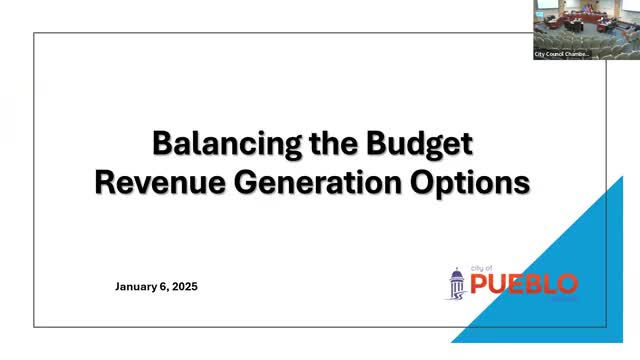City presents options to raise revenue including food tax; council discusses trade-offs
Get AI-powered insights, summaries, and transcripts
Subscribe
Summary
Finance staff outlined options to increase revenue — raising general sales tax, taxing groceries for home consumption, and other enforcement/compliance steps. Staff said ballot language would be needed by August; councilors debated economic effects, alternatives and the need to pair revenue changes with spending cuts or development reforms.
City finance staff on Jan. 6 presented a menu of options to increase municipal revenue, including modest increases to the local sales tax base, a tax on groceries purchased for home consumption and stepped-up compliance and audit efforts.
Valerie (Val) Colombo of the finance/sales-tax division described Pueblo's current local sales tax base and compared Pueblo to other Colorado home-rule cities. She said Pueblo's local sales tax rate that goes to the general fund is 3.0 percent, below the home-rule-city average of about 3.74 percent (based on the slide set shown to council). She said total combined tax in Pueblo is 7.6 percent compared with an average of 8.22 percent across the 66 home-rule cities included in the comparison.
Colombo presented estimated revenue outcomes based on 2023 gross sales and grocery deductions. Using 2023 grocery deductions (which the presentation listed as $373,471,350), staff showed scenarios where a dedicated food-for-home-consumption tax at various rates could generate between roughly $5 million and $25 million annually depending on the rate chosen and whether the city also increased its general sales tax base. For example, staff's slides estimated that a 0.5 percent tax on groceries could produce mid-range millions in additional revenue (slides in the presentation showed graduated projections and per-$200-purchase impacts for consumers).
Colombo also described enforcement and compliance steps the city has taken since implementing the statewide marketplace facilitator and tax-collection systems (referred to in the meeting as SUDs/WAYFAIR implementation): voluntary disclosure agreements with vendors, audit work that recovered revenue, prepaid sales-tax certificates for construction projects and active outreach to e-commerce vendors. She said those compliance efforts produced new revenue and that continuing them is part of the revenue strategy.
Council discussion focused on trade-offs. Some councilors said taxing groceries risks further burdening lower-income households; Councilor Gomez argued that the council should first cut wasteful spending and seek economic development to expand the tax base rather than increase taxes. Councilor Martinez said many peer home-rule cities tax groceries and that a phased-in approach could be used; she expressed support for pursuing more information and noted the council must decide whether to send a measure to the ballot.
Colombo told council the administration would need ballot language by August if the council wished to pursue a voter-approved change in tax authority or a ballot measure for a food tax. Staff suggested the city could structure a grocery tax so revenues were earmarked for capital projects (as Greeley did, per staff's presentation) or create programs to offset impacts for low-income residents. The presentation referenced a variety of possible design choices, including starting at a lower rate and gradually increasing over several years and exempting certain items or creating a rebate program for eligible households.
No final decisions or votes were taken Jan. 6. Councilors asked staff for additional analysis on likely revenue, distributional effects, ballot language options and whether any tax increase could be coupled with legally required earmarks. Several councilors reiterated that increasing revenue should be balanced with expense reductions and incentives to spur private development and job growth. Council and staff set a preliminary planning timeline: staff said ballot language would be required by August to place measures before voters in a future election cycle.
Colombo closed by noting the sales-tax division had increased collections after marketplace facilitator changes and that the division would continue compliance and outreach work alongside any policy changes the council directed staff to explore.
